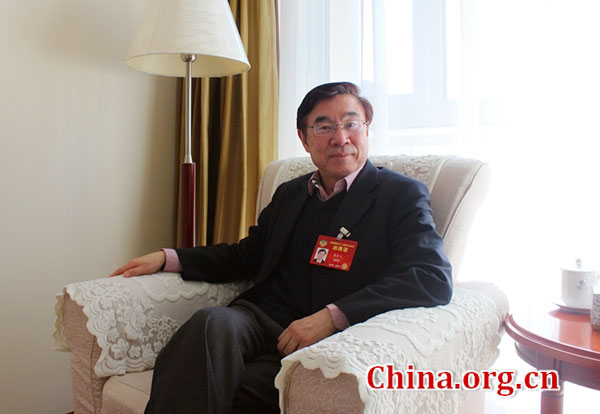CPPCC member: Translators are undervalued in China
china.org.cn / chinagate.cn by Zhang Rui and Zhang Lulu, March 11, 2017 Adjust font size:
 |
|
Huang Youyi, a member of Chinese People's Political Consultative Conference and the executive vice president of the Translators Association of China. [Photo/China.org.cn] |
Huang Youyi, a member of China's top political advisor body, the Chinese People's Political Consultative Conference (CPPCC), said that Chinese translators are undervalued and their payments need to be raised to encourage more people to contribute to an industry badly needed in China, as the country is increasingly in the international spotlight.
Huang, also the executive vice president of the Translators Association of China, made a proposal to China's ongoing legislative meeting that the foreign language versions of China's key documents should be issued along with the Chinese versions, adding that only a few of the foreign versions of the Communist Party of China (CPC) and central government documents were issued with the Chinese versions.
He related an anecdote in May last year when he visited France along with some other CPPCC members. The minute he sat down to a meeting, Huang was asked by his French counterparts about the French version of China's 13th Five-Year Plan blueprint, the document that maps out the country's development for the next five years. Huang said he did not expect so much attention. "But the attention makes sense. It has to do with China's economic development. China is now the world's second largest economy. And their development has a stake in it."
Additionally, Huang said the need for more translators is increasing, as many Chinese companies are reaching out to overseas markets. Chinese companies that invest in foreign countries need to translate information about their products, equipment, technology and management into the local languages.
Huang said that in order to encourage more people to contribute to the translation industry, translators' salaries and payments need to be raised, as they usually find it hard to afford things like housing and children's education with their income. He noted that many people have to take a job in other industries while working on translation in their spare time. "We need professional, full-time translators, but the current average payment is inadequate."
Huang continued to explain that the fairly low payment of translators in China is due to the underestimation of their work. "Translation is a re-creating work. A person may be a master of the Chinese language, but when translating something to foreign languages, one has to have an equal mastery of the foreign languages -- that requires a smart mind and not everyone can handle that."